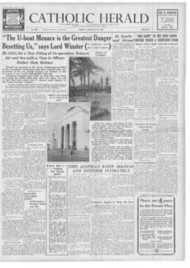Page 3, 29th January 1943
Page 3

Report an error
Noticed an error on this page?If you've noticed an error in this article please click here to report it.
Tags
Share
Related articles
Wrong Verdict On The Raven
In A Cold Climate
Earth And Ourselves
Earth And Ourselves
Earth And Ourselves Mulberry
Earth and Ourselves The stillness of the winter tree
The mem who described the nee in winter as stretching out bare arms and crying for leaves can never have lived. at this season of the year, on a hill from which he could look down at trees, for it is only from this vantage point that thell.whok beauty of a leafless Iree can be appreciated.
The tree without leaves is not a creature lacking fulfilment, rather it has a revealing quality like that of silence after the spoken word or a stillness that precedes the dawn.
The tree in summer can never be still. Even on a windless day there IS innumerable life that rustles and chirps and creeps and clings among its leaves and branches, up its trunk and beneath Its bark. The sells* of a myriad activities holds one in spell. But when the last leaf has been shed Ihe tree resumes its own life; its soul, so long concealed, lies open Jar our learning. The secret of rhythm and balance that has maintained its summer beauty is revealed, and it is this that one sees most sorely from a distance, looking downwards at the whole symmetry of the tree rather than gazing upwards through its branches.
To see an oak tree outlined against a sunrise such as those see have been having lately—an infinitely delicate tracery of greyish black against dim blue flushing info l'OSe, is to glimpse for one half-moment something of what lies behind itS lovely structure.
It is only a half-moment, and memory cannot hold the vision itself, only a consciousness of its passing. hut the consciousness of something that has passed is always a hope for something that is yet to come.
pERHAPS it is a memory of
this—twisted and distorted as ViS1011 must always be when grasped by the avaricious mind of man—that has given rise to all the legends and superstitions concerning trees, and oaks in particular, front the days of the Druids onwards.
In northern countries the oak was sacred to Thor, being said to be of lightning origin, and elves and fairies were supposed to gather round its roots. In dream lore, too, the oak is the sign of longevity; and legend tells us that it was of oak that the Cross was made.
Legend and superstition—yesbiit look at an oak tree in winter, silhouetted against the sky, and as YOU glittIPSe the soul of the tree so you may grasp some of the meaning of legend.
Julian
blog comments powered by Disqus







